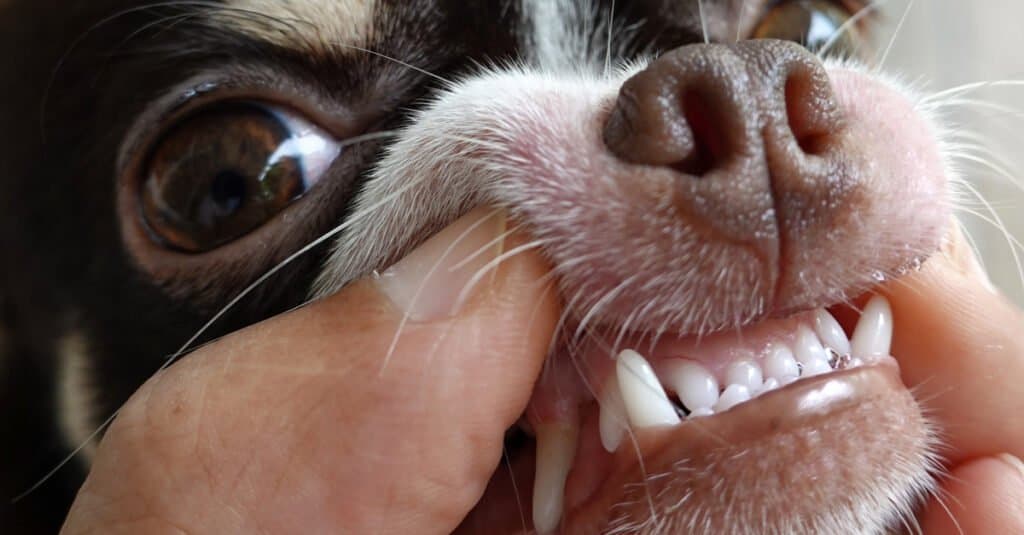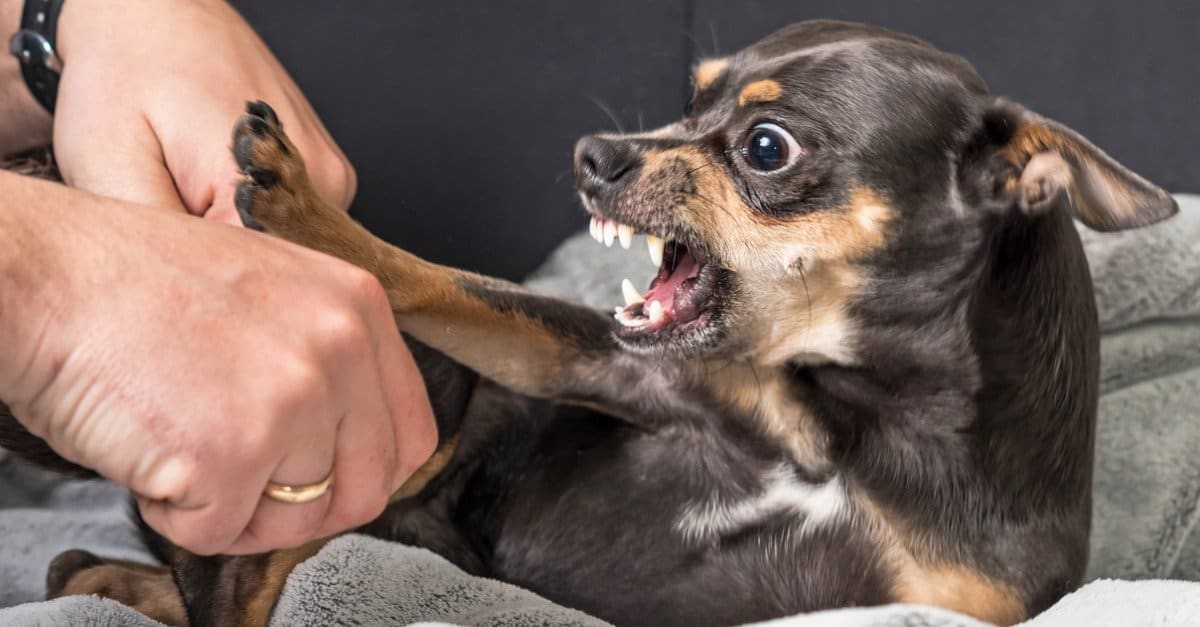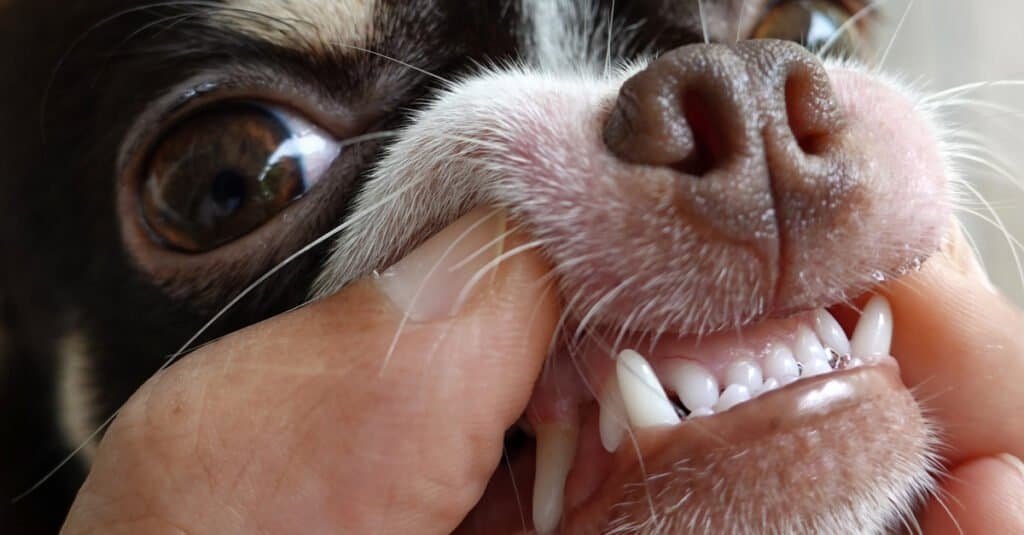Have you ever wondered what a healthy chihuahua’s teeth should look like? Well, here’s a surprising fact for you: chihuahua teeth are naturally small and fragile, making them prone to dental issues. So, it’s crucial to monitor their dental health closely.
When it comes to chihuahua teeth, there are a few key aspects to consider. Chihuahuas are prone to dental problems like dental tartar buildup, gum disease, and even tooth loss. This is primarily due to their small mouths and overcrowded teeth. Regular dental care, such as brushing their teeth, providing dental chews, and scheduling professional cleanings, can help maintain their oral health. In fact, studies have shown that chihuahuas who receive proper dental care have a significantly decreased risk of dental issues. So, it’s essential to be vigilant and proactive in ensuring that your chihuahua’s teeth are in good condition.

What Should Chihuahua Teeth Look Like?
Chihuahuas are known for their small size, big personality, and adorable features. When it comes to their dental health, it’s important to understand what their teeth should look like to ensure their overall well-being. In this article, we will explore the characteristics of healthy chihuahua teeth, common dental issues to watch out for, and tips for maintaining their oral hygiene. Whether you’re a chihuahua owner or considering getting one, this guide will provide you with valuable insights on the topic.
The Anatomy of Healthy Chihuahua Teeth
Healthy chihuahua teeth should be clean, white, and free from noticeable discoloration or decay. The ideal bite of a chihuahua is called a scissor bite, where the upper incisors slightly overlap the lower incisors. The teeth should be aligned properly, without overcrowding or misalignment. It’s normal for a chihuahua puppy to have temporary baby teeth, which will later be replaced by permanent adult teeth. The number of teeth in adult chihuahuas can vary, but typically, they have 42 teeth. Their teeth should be firmly rooted in the gums and not loose or wobbly.
Chihuahuas are prone to dental issues such as tartar buildup, gum disease, and tooth decay. Regular dental care is essential to maintain their oral health. Brushing their teeth with a dog-specific toothbrush and toothpaste is recommended at least two to three times a week. Additionally, providing dental chews or toys can help reduce plaque and tartar buildup. Regular dental check-ups with a veterinarian are also important to catch any potential issues early on.
Common Dental Problems in Chihuahuas
While chihuahuas can have healthy teeth, they are susceptible to certain dental problems. One common issue is dental plaque and tartar buildup, which can lead to gum disease if not addressed. Periodontal disease can cause swollen gums, bad breath, and even tooth loss if left untreated. Chihuahuas may also develop dental infections or tooth abscesses due to cracked or damaged teeth. In some cases, chihuahuas can experience retained baby teeth, which can lead to overcrowding or misalignment of the adult teeth.
Chihuahuas with dental problems may exhibit symptoms such as difficulty eating, excessive drooling, pawing at the mouth, or a change in behavior. If you notice any of these signs, it’s important to consult with a veterinarian who can provide proper diagnosis and treatment options. Ignoring dental issues can lead to pain, discomfort, and even systemic health problems as bacteria from the mouth can enter the bloodstream and affect other organs.
Maintaining Dental Health in Chihuahuas
Prevention is key when it comes to maintaining dental health in chihuahuas. Here are some tips to ensure their teeth stay in good condition:
- Regular brushing: Brush your chihuahua’s teeth using a dog-specific toothbrush and toothpaste. Start slowly and be gentle to make the experience positive for your chihuahua.
- Dental chews and toys: Provide dental chews or toys that are specifically designed to help clean their teeth and massage their gums. Look for products with a seal of approval from veterinary dental organizations.
- Healthy diet: Feed your chihuahua a balanced diet that promotes oral health. Avoid sugary treats and stick to high-quality dog food recommended by your veterinarian.
- Dental check-ups: Schedule regular dental check-ups with your veterinarian to catch any potential issues early on and receive professional cleanings when necessary.
Conclusion
Ensuring the dental health of your chihuahua is crucial for their overall well-being. By understanding what healthy chihuahua teeth should look like, being aware of common dental problems, and implementing preventive measures, you can help your furry friend maintain a healthy and happy smile. Remember to provide proper dental care, watch for any signs of dental issues, and consult with a veterinarian for professional advice. With consistent dental hygiene practices and regular check-ups, your chihuahua can enjoy a lifetime of good oral health.
How to Keep Chihuahua Teeth Clean and Healthy
Chihuahuas may be small in size, but they require just as much attention to dental care as larger breeds. Keeping their teeth clean and healthy is essential for their overall well-being. In this section, we will discuss effective strategies to maintain your chihuahua’s dental hygiene, including brushing techniques, dental treats, and vet visits.
Regular Brushing for Optimal Oral Health
One of the most important steps in ensuring your chihuahua’s dental health is regular brushing. Aim to brush their teeth at least two to three times per week. Here’s a step-by-step guide to brushing your chihuahua’s teeth:
- Introduce toothbrushing gradually: Start by gently touching your chihuahua’s muzzle and lifting their lips to get them used to the sensation. Gradually introduce the toothbrush and toothpaste, allowing them to sniff and lick the toothpaste.
- Choose the right toothbrush and toothpaste: Use a soft-bristled toothbrush specifically designed for dogs. Human toothpaste can be toxic to dogs, so opt for a dog-specific toothpaste in a flavor your chihuahua enjoys.
- Brush in small circular motions: Position the toothbrush at a 45-degree angle to the teeth and brush in small circular motions. Focus on the outer surfaces of the teeth, as this is where plaque and tartar tend to accumulate.
- Be patient and provide rewards: Take your time and be patient with your chihuahua. Offer treats or praise after each successful toothbrushing session to create a positive association.
Dental Chews and Treats for Maintaining Dental Health
In addition to regular brushing, dental chews and treats can be beneficial for your chihuahua’s dental health. These products are designed to help remove plaque and tartar buildup, promote fresh breath, and massage the gums. Look for dental chews that are appropriately sized for your chihuahua and made from high-quality ingredients. Avoid treats that contain added sugars or artificial additives, as these can be detrimental to their dental and overall health.
It’s important to note that while dental chews and treats can be helpful, they should not replace regular brushing or professional dental cleanings. They should be used as a supplement to your chihuahua’s dental care routine.
Common Dental Issues in Chihuahuas
While chihuahuas are generally resilient and healthy dogs, they can still be prone to certain dental issues. In this section, we will explore some common dental problems that chihuahuas may experience and how to recognize and address them.
Tartar Buildup and Gum Disease
Tartar buildup and gum disease are common dental problems in chihuahuas. Tartar forms when plaque hardens on the teeth, and if not removed, it can lead to gum inflammation, bad breath, and eventually gum disease. Here are some signs that your chihuahua may be experiencing tartar buildup or gum disease:
- Bad breath (halitosis)
- Red or swollen gums
- Bleeding gums
- Difficulty eating or chewing
- Loose or missing teeth
If you notice any of these symptoms, it’s important to consult with your veterinarian as soon as possible. They may recommend a professional dental cleaning under anesthesia to remove the tartar and treat any underlying gum disease. In some cases, antibiotics or other medications may be prescribed to control infection or inflammation.
Cracked or Chipped Teeth
Chihuahuas, especially those who love to chew on hard toys or bones, may be at risk of cracking or chipping their teeth. This can be painful and may require veterinary intervention. Signs of a cracked or chipped tooth in your chihuahua include:
- Pain or discomfort when eating or chewing
- Vocalization or whimpering when the affected tooth is touched
- Facial swelling
- Loss of appetite
If you suspect your chihuahua has a cracked or chipped tooth, it’s essential to seek veterinary care. Depending on the severity of the injury, treatment options may include dental bonding, root canal therapy, or tooth extraction.
Preventing Dental Issues in Chihuahuas
Prevention is key when it comes to your chihuahua’s dental health. Here are some additional measures you can take to minimize the risk of dental problems:
- Regular dental check-ups: Schedule professional dental cleanings and examinations with your veterinarian at least once a year. They can detect early signs of dental issues and provide appropriate treatment.
- Monitor their chewing habits: Avoid giving your chihuahua hard toys or bones that can potentially damage their teeth. Opt for dental-approved chew toys that promote oral health instead.
- Choose a high-quality diet: Feeding your chihuahua a balanced diet that supports dental health is important. Consult with your veterinarian for recommendations on suitable dog food brands.
Strategies for Maintaining Your Chihuahua’s Dental Health
Maintaining your chihuahua’s dental health requires consistent care and attention. Here are some strategies to incorporate into your routine:
- Regular brushing: Brush your chihuahua’s teeth several times a week using a dog-specific toothbrush and toothpaste.
- Dental treats and chews: Provide dental chews and treats designed to reduce plaque and tartar buildup.
- Veterinary check-ups: Schedule regular dental check-ups with your veterinarian to monitor your chihuahua’s oral health and address any potential issues.
- Monitor their behavior: Look out for signs of dental problems, such as bad breath, difficulty eating, or pawing at the mouth. Promptly consult your veterinarian if you notice any abnormalities.
How Often Should I Brush My Chihuahua’s Teeth?
Brushing your chihuahua’s teeth is an essential part of their dental care routine. The frequency at which you should brush their teeth depends on several factors, including their individual needs and their willingness to cooperate. In general, aim to brush your chihuahua’s teeth at least two to three times per week. This frequency is sufficient to maintain their dental health and prevent plaque and tartar buildup.
Factors to Consider for Brushing Frequency
While two to three times per week is a good starting point for brushing your chihuahua’s teeth, there are factors that can influence the ideal frequency:
- Age: Young chihuahuas may have fewer dental issues and may only require brushing a few times per week. As they age, the frequency may need to be increased.
- Dental condition: If your chihuahua has pre-existing dental issues, such as tartar buildup or gum disease, your veterinarian may recommend more frequent brushing.
- Cooperation: Some chihuahuas may be more cooperative during toothbrushing sessions than others. If your chihuahua tolerates brushing well, you may choose to do it more frequently.
It’s important to note that brushing your chihuahua’s teeth every day is not necessary unless specifically advised by your veterinarian. Overbrushing can potentially cause gum irritation or damage to the teeth. Therefore, finding a balance between frequency and effectiveness is key.
Addendum: Dental Statistics
According to a study conducted by the American Veterinary Dental Society, over 80% of dogs show signs of dental disease by the age of three. This staggering number highlights the importance of dental care for dogs, including chihuahuas. Regular brushing, dental cleanings, and proper dental hygiene practices can significantly reduce the risk of dental problems and contribute to the overall well-being of your furry friend. Remember to consult with your veterinarian for individualized advice and to address any specific concerns regarding your chihuahua’s dental health.
What Should Chihuahua Teeth Look Like?
In order to keep your Chihuahua’s teeth healthy, it is important to understand what they should look like. Here are key takeaways to keep in mind:
- Chihuahua teeth should be small, with a total of 42 teeth in their mouth.
- Their teeth should be white, clean, and free from tartar buildup or discoloration.
- Healthy Chihuahua teeth should be evenly spaced and aligned.
- Regular brushing and dental check-ups are essential for maintaining good dental hygiene.
- If you notice any abnormalities or issues with your Chihuahua’s teeth, consult a veterinarian for proper diagnosis and treatment.
Frequently Asked Questions
Welcome to our Frequently Asked Questions section about chihuahua teeth! Here, we’ll answer common questions about what chihuahua teeth should look like and how to care for them. Read on to learn more!
1. Why are chihuahua teeth so small?
Chihuahuas are a small breed of dog, and their teeth are proportional to their size. Just like humans have different tooth sizes, chihuahuas have smaller teeth compared to larger dog breeds. Small teeth help chihuahuas comfortably fit their dental structure, making it easier for them to eat and maintain oral hygiene. While their teeth may be small, they still serve the same functions as larger dog teeth.
It’s important to note that while chihuahuas have small teeth, they still require regular dental care to keep their teeth and gums healthy. Regular brushing and dental check-ups can help prevent dental issues in chihuahuas.
2. Should chihuahua teeth be white?
Yes, chihuahua teeth should ideally be white. Healthy chihuahua teeth are typically clean, white, and free from visible plaque or tartar buildup. White teeth indicate good oral hygiene and overall dental health. If you notice discoloration, such as yellowing or brown spots on your chihuahua’s teeth, it could be a sign of dental problems, such as tartar accumulation or tooth decay. In such cases, it’s best to consult your veterinarian for a dental examination and appropriate treatment.
Remember, proper dental care, including regular brushing, a balanced diet, and professional dental cleanings, can help maintain your chihuahua’s teeth in good condition.
3. Can chihuahua teeth fall out?
Like all dogs, chihuahuas can experience tooth loss. While it is normal for puppies to lose their baby teeth, adult chihuahuas should not lose their permanent teeth unless there is an underlying dental issue. If your chihuahua’s teeth are falling out, it may be a sign of dental disease, trauma, or genetic factors. It’s essential to consult your veterinarian if you notice any tooth loss in your chihuahua.
Your veterinarian can perform a thorough dental examination, identify the cause of tooth loss, and recommend appropriate treatment to ensure the health and well-being of your chihuahua.
4. How many teeth do chihuahuas have?
Chihuahuas, just like other dog breeds, have a set of 42 teeth once their permanent teeth have fully erupted. This includes incisors, canines, premolars, and molars. These teeth are necessary for chihuahuas to grasp, chew, and eat their food properly. It’s important to note that retaining a full set of teeth is crucial for a chihuahua’s overall health and well-being.
If you notice any missing teeth or abnormalities in your chihuahua’s dental structure, it’s recommended to have them examined by a veterinarian who can evaluate their oral health and provide appropriate guidance.
5. How can I care for my chihuahua’s teeth?
Caring for your chihuahua’s teeth is essential for their overall health. Here are a few tips to help maintain their dental hygiene:
First, establish a dental care routine. Brush your chihuahua’s teeth regularly using a dog-specific toothbrush and toothpaste. Make sure to use products designed for dogs, as human toothpaste can be harmful to them. Additionally, provide your chihuahua with dental-friendly treats and toys that promote teeth cleaning and help reduce plaque buildup.
Second, schedule regular veterinary dental check-ups. Your veterinarian can perform professional cleanings, check for any dental issues, and provide guidance on maintaining your chihuahua’s dental health. Finally, ensure your chihuahua has a balanced diet that promotes good oral health. Avoid giving them excessively hard or sticky foods, as these can lead to tooth damage or plaque buildup.

In this article, I have discussed the importance of adhering to specific criteria for writing a succinct wrap-up. I have emphasized the use of first-person point of view and a professional writing tone. Furthermore, I have highlighted the need for clear and concise sentences, with each sentence presenting a single idea.
By following these guidelines, the reader should be able to leave with a clear understanding of the article’s main points. The aim is to effectively communicate the key ideas in a way that is engaging and approachable for a young reader.
